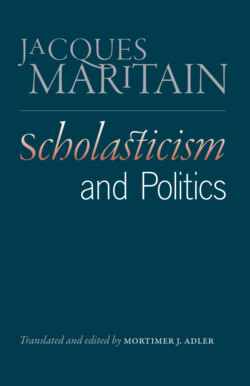Читать книгу Scholasticism and Politics - Jacques Maritain - Страница 6
На сайте Литреса книга снята с продажи.
FOREWORD
ОглавлениеThis book contains the text of nine lectures which were given in the United States during the autumn of 1938. However varied the topics dealt with may be, the general purpose, which makes the organic unity of the volume, is easily perceptible. It is entirely permeated with the idea of the human person, considered in his spiritual dignity and the concrete conditions of his existence.
That which naturally forms the basis of the eminent dignity of the person is human capacity for knowing the truth (hence Chapter II). It is also necessary to determine in what personality itself consists (Chapter III); what constitutes the freedom of the human person (Chapter V); what is the meaning and the finality of his life (Chapter VII); and it is not without interest to observe the failure of the materialistic theories which sprang from a false interpretation of Freud’s discoveries (Chapter VI). But the chief aim of this book is moral and practical. This explains why it opens with the author’s general ideas concerning integral humanism and the crisis which the modern world is undergoing (Chapter I). It also attempts to solve some of the fundamental problems of political philosophy and of the philosophy of modern history (Chapters I, III, IV, V, VIII, IX).1 Generally speaking, the speculative considerations which will be found here are part of the context of practical philosophy.
To my mind, it is through a sound philosophy of the person that the genuine, vital principle of a new Democracy, and at the same time of a new Christian civilization, can be rediscovered; and this involves an extensive work of purification of the ideas that the world has received from the eighteenth and nineteenth centuries.
The dangers imperilling civilization and threatening an overwhelming crisis, due to the errors which weigh upon modern history, appear to concern Europe more immediately than the New Continent. It may be that, in America, there is still time for mankind to eliminate these errors by a creative effort of intelligence and liberty rather than by offering itself up as a victim to the forces of fatality. That is why the philosophical revival which is taking place here and there in the United States, especially among the younger generation, is, in my opinion, of particular importance for the future of civilization. If this intellectual and spiritual revival, and the historical movement of the working masses searching for a new social order, could meet and interpenetrate, the chances for a new Christendom,—in the hope of which this book has been written,—would be still greater.
It is a great satisfaction for me to be able to thank here the friends who, with the kindness and graciousness so characteristic of this country, have helped me with the translation of these essays and to overcome the difficulties which a philosopher necessarily encounters when expressing himself in a language which, however dear to him, is not his mother-tongue. I am indebted to President Hutchins and Mrs. Robert Hutchins, Mrs. Mabel Wing Castle and Mrs. John Nef, Reverend Father Ward and Professor Earl Langwell, for having so willingly aided and encouraged me. And I am particularly grateful to Professor Mortimer J. Adler, who has sympathetically revised the whole of the volume. To him, and to all, I express here my sincere gratitude.
